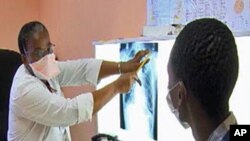Twenty-five thousand people are expected to gather in Vienna July 18 to 23 for the World AIDS Conference. Global health experts will focus on a lethal line-up - HIV/AIDs and tuberculosis. TB is a leading cause of HIV-related deaths worldwide. The World Health Organization says 40 percent of people with TB in South Africa also have HIV. The co-infection rate is highest in the township of Kayelitsha. And, there is a growing threat from multi-drug resistant TB, an aggressive strain that is much more difficult to treat.
Caregiver Mercy Nongongo runs a small soup kitchen from a tiny shack. She buys the ingredients with her own money and makes sure that TB patients have something to eat before taking their medicine.
"They know that the work I'm doing is going to help them," said Mercy Nongongo. "They believe in me."
TB has a firm grip on the township of Khayelitsha on the outskirts of Cape Town. Patientsat the community clinic say despite being sick, they are hopeful. The clinic has seen an increase in the number of people with multi-drug-resistant tuberculosis or MDR TB. It's a virulent strain that occurs when a person with TB fails to complete the six to nine-month course of medication or catches TB from another person who is ill with a drug resistant-strain. The problem? It often takes more than two months to diagnose MDR-TB.
Dr. Sweetness Siwendu treats TB patients at Site C Clinic:
"It would be really great if we could have a vaccine - and if not, then at least be able to diagnose TB as soon as possible - preferably within the same day," said Dr. Siwendu.
On the other side of town, scientists are working on a genetic test they hope will cut the time it takes to diagnose MDR-TB from 70 days to two days. Their work dovetails with research at the South African Tuberculosis Vaccine Initiative where Dr. Sizulu Moyo and other researchers are trying to develop vaccines to prevent TB.
"I think the prospects are good," said Dr. Moyo. "There are a lot of players that have come in - and there's a lot of support from organizations such as the WHO… I think that creates a good environment where people can work and make progress in getting together a new vaccine."
While researchers continue to work on vaccines, the key is to raise awareness around treating TB.
The World Health Organization aims to reduce by half the number of people who die from tuberculosis by the year 2015. Communities like Kayelitsha are key. Here, care at home and in a clinic helps people follow through on their treatment.
"No one today need die of TB," said Dr. Marcos Espinal. "No child should see the life of a mother or father destroyed by a disease that is completely curable. We need to challenge governments, decision-makers and community leaders to stand together to fight TB and eventually wipe out this devastating disease."
And it's people like Gladys Jaxa, says Dr. Marcos Espinal of the Stop TB Partnership, who would benefit. She has MDR-TB and now is dependent on Mercy Nongongo for medicine. It's vital that she completes the course of up to two years of pills and injections. If she lapses, she could infect 10 to 15 people a year, one or two of whom may develop full blown TB or MDR-TB. But while the medication can be unpleasant, Jaxa is already noticing the difference it makes.
"Before the treatment, I couldn't even walk….I was hopeless," said Gladys Jaxa. "Now after treatment, I can even go to the toilet, I can go to the shop, I can do little things."
It's the little things that Mercy Nongono and her helpers do best for their patients. But those little things make a big difference.















